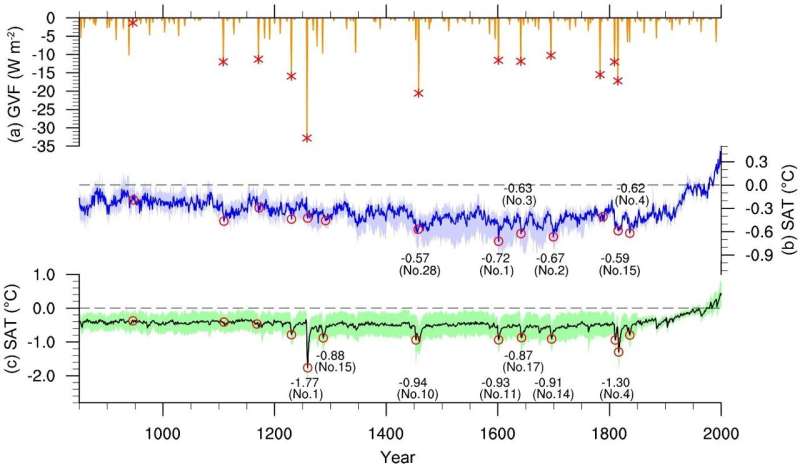This article has been reviewed according to Science X's editorial process and policies. Editors have highlighted the following attributes while ensuring the content's credibility:
fact-checked
peer-reviewed publication
trusted source
proofread
Impacts of major volcanic eruptions over the past two millennia on both global and Chinese climates

Recently, a study by Dr. Sun Weiyi and Prof. Liu Jian from the School of Geography at Nanjing Normal University was published in Science China Earth Sciences.
Based on multiple data from observations, reconstructions, simulations, and assimilations over the past 2000 years, the research team systematically summarized the historical facts of major volcanic eruptions, the characteristics and mechanisms of their climatic impact, and directions for future research.
The reconstructions of volcanic activity over the past two millennia reveal that cold epochs (530–700 AD, 1200–1460 AD, and 1600–1840 AD) coincided with frequent major volcanic eruptions, while warm epochs (0–200 AD and 900–1100 AD) occurred during volcanic quiescence. The eruption of Changbai Mountain in 946 AD was identified as the strongest volcanic eruption in China over the past 2000 years.
The research indicates that significant cooling occurred throughout the globe and China several years after eruptions. The reconstructed cooling magnitude does not entirely align with volcanic intensity, but there is a significant linear relationship between the cooling simulated by climate models and volcanic intensity.
Continuous volcanic eruptions lead to decadal-scale cold events in the Northern Hemisphere and China on the decadal time scale. In the first year after eruptions, monsoon precipitation globally significantly decreases, while precipitation in the Yangtze River Basin in China abnormally increases. There are inconsistent responses among different datasets in North China, Northeast China, and the southern part of the Qinghai-Tibet Plateau.
The research team also reviewed previous reconstructions of El Niño-Southern Oscillation (ENSO) based on tree-ring data over the past millennium. They found that after tropical major volcanic eruptions, El Niño events occurred, followed by a rapid decline into La Niña. This caused anomalous Northwest Pacific anticyclones, transporting moisture to the Yangtze River Basin. However, coral δ18O records from the central tropical Pacific show no significant El Niño event after major volcanic eruptions, indicating discrepancies between reconstruction data.
Frequent major volcanic eruptions can influence the phase changes of the Atlantic Multidecadal Oscillation (AMO) by triggering processes such as Arctic sea ice expansion, air-sea interactions, and changes in oceanic dynamic processes. The responses of ENSO and AMO to volcanoes will further impact regional climate response differences, potentially causing disparities between reconstructed and simulated data.
Future research should focus on enhancing the in-depth understanding of the impact processes of internal variability in the climate system under volcanic influence, such as hydroclimate, weather and seasonal-scale variability changes, and climate anomalies. This relies on improvements in volcanic-forcing reconstruction, the development of stratospheric chemistry-aerosol-climate models, and a more comprehensive revelation of the climatic effects of major volcanic eruptions.
More information: Weiyi Sun et al, Impacts of major volcanic eruptions over the past two millennia on both global and Chinese climates: A review, Science China Earth Sciences (2023). DOI: 10.1007/s11430-022-1218-0
Journal information: Science China Earth Sciences
Provided by Science China Press




















